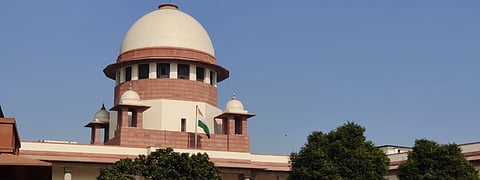
- Latest Legal News
- News
- Dealstreet
- Viewpoint
- Columns
- Interviews
- Law School
- Legal Jobs
- हिंदी
- ಕನ್ನಡ

A three-judge bench of the Supreme Court headed by Justice Ashok Bhushan issued notice to Telegu Desam Party (TDP) leader Varla Ramaiah on an appeal by Andhra Pradesh government against Andhra Pradesh High Court order stalling probe into Amaravati land scam.
The bench which also comprised Justices Subhash Reddy and MR Shah issued notice on the prayer to set aside the High Court order and also on the interim prayer to grant a stay on the September 15 order which had stayed a probe by Special Investigation Team into the alleged scam.
The YS Jaganmohan Reddy government had constituted SIT alleging massive irregularities during the previous government's tenure in the case concerning sale of land in Amaravati. A First Information Report (FIR) was registered by the State’s Anti Corruption Bureau naming many beneficiaries including daughters of a sitting Supreme Court judge.
However, TDP leaders Varla Ramaiah and Raja filed a petition in the AP High Court challenging the formation of the SIT pursuant to which the High Court stayed the government orders setting up the SIT. It also barred media from reporting contents of the FIR. The State government then approached the Supreme Court against the High Court order.
The SIT was set up to exercise powers to investigate and file chargesheet on irregularities during the tenure of previous government and was also empowered to investigate and file cases on the contents of the report given by the Cabinet Sub-Committee on past government's decisions.
After the order of High Court, the CM’s principal advisor Ajeya Kallam had, on October 10 held a press conference accusing Supreme Court judge, Justice NV Ramana and the AP High Court of attempting to destabilise and topple the YSR Congress government in the State in connivance with TDP president N Chandrababu Naidu.
Senior Advocate Dushyant Dave, arguing for the state government on Thursday, first attacked the locus of Ramaiah in the case.
"Unless you are personally affected by the action of the state a writ is not maintainable. This is what always have been held by this Court. Whatever wrong the previous government might have done, should that go unchecked? Constitution bench judgments run contrary to this. SIT was supposed to probe this. What natural justice has been served here? Plea is bereft of any detail by a man with no locus," argued Dave.
Dave further submitted that the State government had even requested the Centre for a CBI probe into the case in March, 2019. However, till date there has been no response.
Dave cited a slew of judgments to buttress his case that the High Court cannot interfere at a preliminary stage of the investigation.
"Courts should refrain to interfere in a premature stage of investigation. This demoralises the probe. High Court does not have extra ordinary power and is bound by Supreme Court judgments. For 75 years this Court has said that High Court cannot interfere at this stage," submitted Dave.
The TDP leaders in their plea before the High Court had argued that "the Executive actions of a government were prospective and not retrospective and the people’s mandate in favour of the party which came to power did not include a review of policy decisions of the outgoing government".
They suggested that the entire exercise of SIT had mala fide intentions and lacked legal basis.
The Andhra Pradesh High Court while staying the SIT probe had noted that "rule of law demands continuity and a new government cannot be permitted to overturn the decisions of the previous government."
The High Court had further held that government, in exercise of its executive powers, does not have an ‘inherent’ power of review.
However the plea before the top court contended that investigation in this case could not be termed as a "power of review."
"Act of conducting investigation cannot be termed as a ‘review’ in the sense in which the HC has understood it. Secondly, the aforesaid doctrine is applicable to Judicial and Quasi-Judicial bodies in exercise of their judicial functions. It is nobody’s case that any judicial functions were being exercised," states the appeal before SC.
Senior Advocate Shekhar Naphade too represented the State.